In a nutshell:
- Lead scoring software helps businesses identify the most probable customers and prioritize their efforts.
- It allows sales and marketing teams to focus on the most promising opportunities and improve collaboration.
- Key performance indicators (KPIs) for monitoring success include conversion rate and lead engagement metrics.
- Features of a good lead scoring platform include integration with CRM and customizable scoring models.
- The top five lead-scoring solutions in 2024 are Pecan AI, HubSpot, Salesforce, Keap, and Zoho.
Sorting through a ton of leads is a huge challenge for businesses that want to identify the most probable customers.
Some are ready to purchase, while others are just exploring. This can be a big pain point because you want to focus your efforts on the ones who are likely to become paying customers.
That’s where lead scoring software comes in. Businesses use lead scoring to sort and rank leads, pinpointing those with the highest potential for conversion.
This approach allows your sales and marketing teams to focus their efforts on the most promising opportunities and also addresses a critical challenge faced by businesses.
According to a recent survey, 33.3% of businesses believe inadequate insights into the audience is their biggest hurdle in lead generation.
-
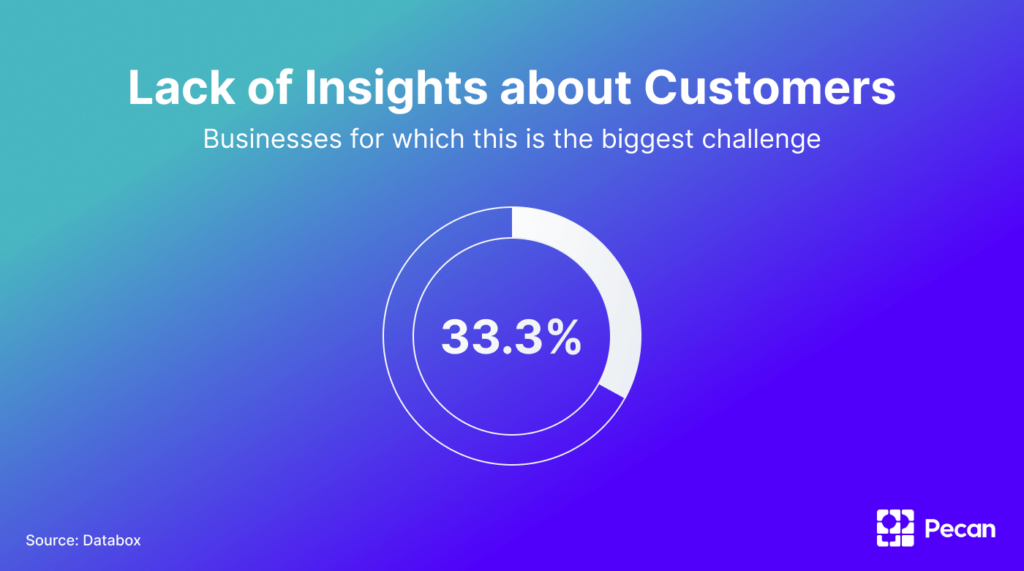
- Lead scoring software can help businesses gain deeper knowledge about prospects and customers
In this article, we’ll explore the importance of lead-scoring software and some of the leading solutions in 2024.
What is lead scoring software?
All salespeople know the struggle behind identifying qualified prospects, and lead scoring is the key to overcoming it.
The first step is to collect data, which includes gathering lead information from website visitors, email communication, and social media interactions.
Your sales teams can then use lead-scoring software to prioritize and rank these leads.
Predictive lead scoring leverages historical data (behavior data, intent data, firmographic data, and sales data) to predict the likelihood of a lead converting to a sale.
First, for predictive lead scoring to work properly, companies must analyze historical data (rejected leads and converted lead history). Then, that data can be used to develop an ideal customer profile (ICP). With this in mind, you can score new leads based on their similarities to your established ICP.
According to leading research reports, only 25% of your inbound leads should advance to sales. To be sure, many unqualified leads enter the system, taking time away from better-qualified opportunities. In essence, lead scoring maximizes your sales team’s time with opportunities that lead to pipeline and closed deals.
As a testament to its growing importance, the global lead-scoring software market is anticipated to generate around $5 billion by 2031.
Benefits of Lead Scoring Software
Lead scoring solutions bring a range of benefits, making them an important asset for businesses today.
It allows you to prioritize leads based on how likely they are to convert.
Your sales reps can then easily concentrate on the promising leads, keeping them from wasting valuable time pursuing uninterested prospects. This is especially important if your sales outreach is resource-intensive, requiring a high-touch approach or multiple contacts.
Additionally, lead scoring promotes collaboration between the marketing and sales teams. It gives them a common framework for evaluating lead quality, so both teams are aligned in their efforts.
In fact, a survey by HubSpot revealed that 43% of salespeople believe sales and marketing alignment has helped them deliver better results.
-
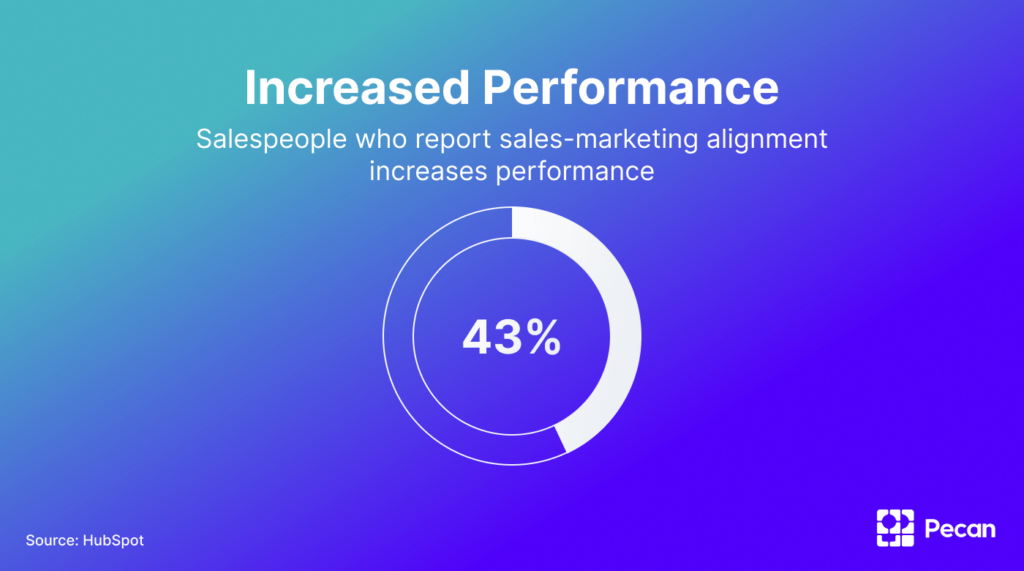
- Implementing lead-scoring software can support sales-marketing alignment
The software's ability to assign scores to leads based on various criteria leads to more targeted marketing campaigns.
This, in turn, improves the overall effectiveness of your marketing strategies.
By helping you identify and prioritize hot leads, lead scoring improves the entire sales process and maximizes sales productivity.
KPIs for monitoring success
For your lead scoring efforts to succeed, you’ll need to track the following performance indicators:
- Conversion Rate: Calculate the percentage of leads that convert from potential customers to paying clients.
- Lead to Opportunity Ratio: You should evaluate the progress of leads in the sales funnel using the Lead to Opportunity Ratio to ensure no promising prospects are squandered.
- Revenue Generated from Scored Leads: Based on your lead scoring efforts, it's important to assess the financial impact of your scored leads.
- Lead Engagement Metrics: Track how actively leads are engaging with your brand across social media.
- MQL to SQL Ratio: Monitor the marketing-qualified leads (MQL) to sales-qualified leads (SQL) ratio.
Benefits of machine learning-based predictive lead scoring
Without a doubt, today’s companies have massive amounts of data at their disposal. Coupled with that data, the AI/ML approach to predictive lead scoring offers many benefits:
- Minimize Errors: Automated scoring and enrichment minimize errors from manual data entry. In turn, automation improves the accuracy of lead scoring and opportunity recognition.
- Data Patterns: AI identifies complex patterns in your data that are unrecognizable to the human eye. Uncovering these patterns allows you to discover new traits in leads, offering new opportunities to score leads and predict opportunities.
- Virtuous Cycle: Machine learning allows you to continuously update your scoring model. This ongoing refinement not only updates your scores with every new lead and opportunity but also keeps your scoring model current as your business grows and your product portfolio changes throughout the years.
Features of a good predictive lead scoring software platform
- Own Your Data: With any lead scoring platform, you need full control over your data. In any event, be wary of any lead scoring platform that will tag your properties, score your leads, and mix your data with other brands.
- Data Connectors and Integration with CRM: Make sure your broader customer relationship management and marketing efforts are connected with your lead scoring system. The platform should connect with your systems of record to allow easy scoring and action on the scores. Also, connecting your predictive lead scoring platform to your marketing automation tools allows you to seamlessly push audiences to email or paid advertising platforms.
- Data Prep: Data prep accounts for roughly 80% of the time spent in creating predictive models. AutoML platforms eliminate resource requests needed in creating predictive lead scores.
- Enrichment Opportunities: For many seasonally oriented companies, working with third-party data enrichment providers (e.g., for weather data) is critical. When picking a predictive lead sourcing platform, understand your options for enriching your data to better score leads.
- Transparent Platform: Your lead-scoring software must offer transparency in how the predictive algorithm scores leads and opportunities. Otherwise, you’re working in the dark and unable to adjust based on what you’re learning from your data and process.
- Customization: Predictive lead scoring should be customized to your business, KPIs, and business needs.
- Optimization: A strong platform supports continuous improvement by using machine learning capabilities to enhance your lead scoring over time.
-
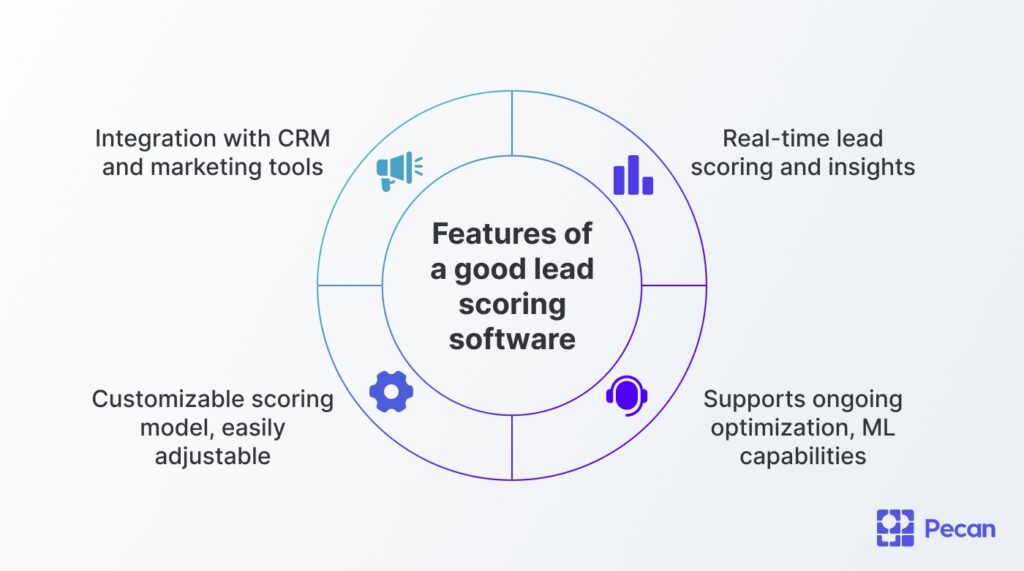
- Which features of lead scoring software matter most for your team?
Top Lead Scoring Software Solutions in 2024
Lead Scoring Software #1: Pecan AI
-
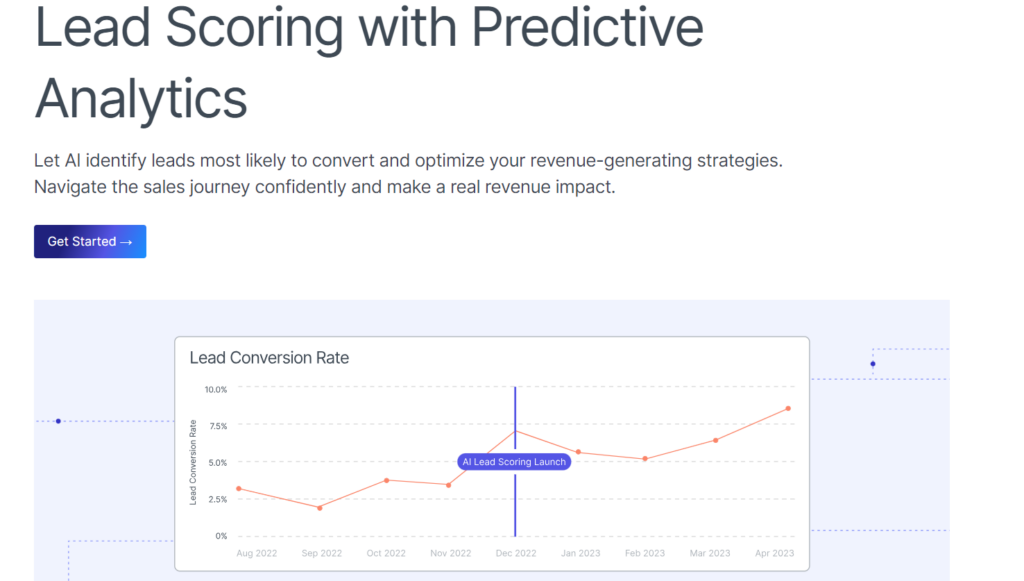
- Lead scoring software from Pecan
Pecan AI’s predictive lead-scoring solution generates AI-driven insights, allowing you to make well-informed decisions.
Key features:
- Automatic lead scoring: Uses ML to automatically prioritize and rank based on their likelihood to convert into customers. Less time-consuming and not prone to human errors, unlike manual scoring.
- Continuous model updates: Pecan ensures accurate lead scores and current data by consistently updating models.
- Machine learning: Categorize customers by their position in the sales pipeline through machine learning capabilities.
- Integrations: Pecan.ai integrates with multiple data sources and systems such as Firebase, Salesforce, IBM, Google, Big Query, and Oracle.
- Predictive capabilities: Data can be generated by users posing predictive questions about business problems.
- User-friendly dashboard: Quickly interpret data with an intuitive dashboard. It allows for continuous adjustments to your model with ease.
- Data security: Pecan ensures that your customer data is 100% secure through regular assessments and security measures.
Best fit:
Pecan's advanced capabilities can benefit businesses of all sizes seeking automatic, predictive lead scoring to improve their conversion and sales pipeline.
Pricing:
Lead Scoring Software #2: HubSpot
-
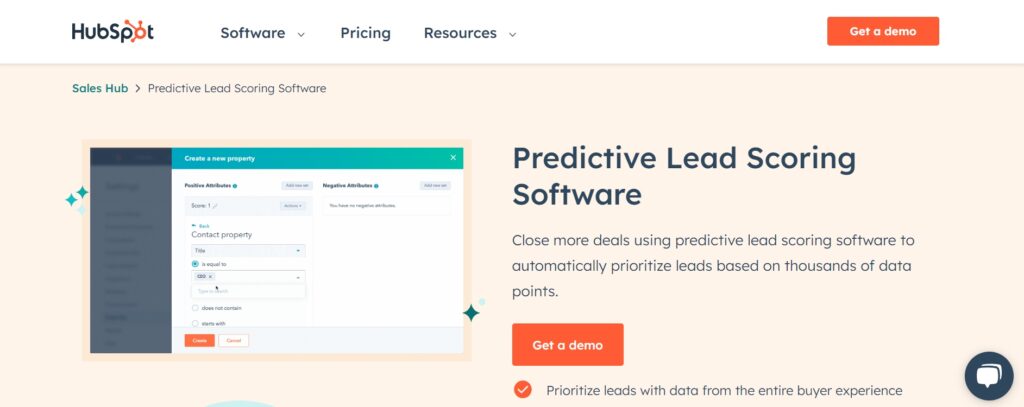
- Lead scoring software from HubSpot
HubSpot's predictive lead scoring software evaluates leads holistically, studying data from the entire customer journey map.
Key features
- Custom scoring: Lets you create up to 25 unique scoring models, ensuring a thorough assessment of leads based on individual business cases and goals.
- Flexible scoring: Toggle between manual and predictive lead scoring.
- Integrated marketing: Integrates email segmentation, representative notifications, and personalized web content.
- Machine learning feature: Studies multiple data points to qualify leads while keeping in mind varying business requirements.
Best fit:
HubSpot suits small and medium businesses and large corporations seeking flexible lead scoring.
Pricing:
HubSpot’s predictive lead scoring is available only in the Enterprise plan for HubSpot Marketing Hub ($3,600/month) and Sales Hub ($1,200/month).
Lead Scoring Software #3: Salesforce
-
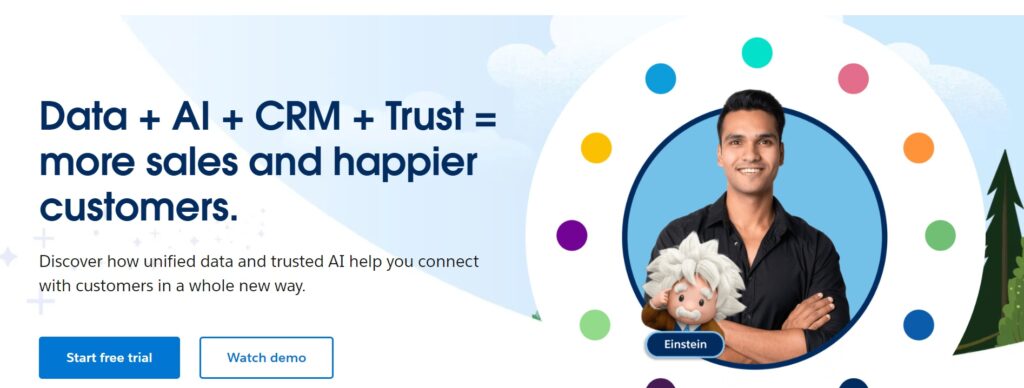
- Lead scoring software from Salesforce
Einstein lead scoring is an AI and ML feature built within the Salesforce CRM. It works by comparing current leads to previously converted leads to identify commonalities.
Key features:
- AI-based predictions: With AI and ML capabilities, Einstein looks at past lead data. Both closed-lost and closed-won opportunities are considered.
- Latest behavior: Once every ten days, Einstein updates the lead data to ensure lead scoring remains relevant.
- Data integration: To determine lead quality, it uses multiple data points, including demographic information, email interactions, website visits, and lead sources.
- Lead score field: A dedicated lead score field prioritizes tasks for sales teams. Leads are ranked based on how well they compare to converted leads from the past and their potential.
Best fit:
Suitable for businesses already using Salesforce CRM with ample data already on hand within Salesforce.
Pricing:
Accessible at $50 per user per month. However, it’s exclusively available with the enterprise plan ($4,000/month) as an add-on for Salesforce Sales Cloud. No free trial is available.
Lead Scoring Software #4: Keap
-
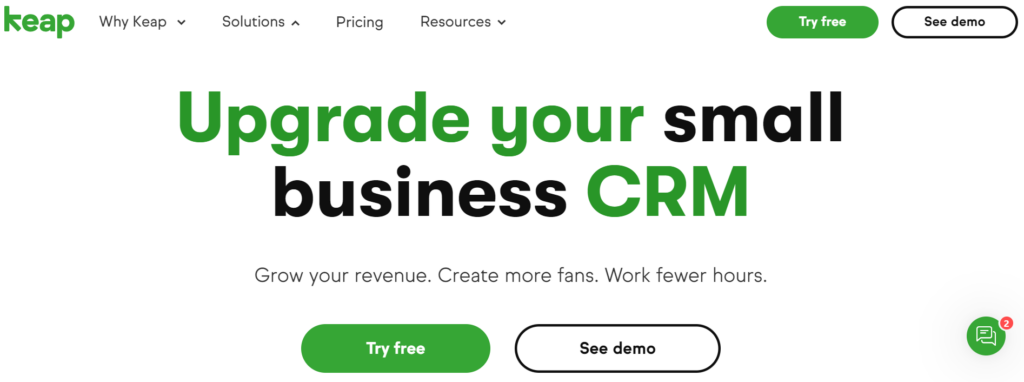
- Lead scoring software from Keap
Keap is a good fit for small businesses and has a built-in CRM system with a lead-scoring component.
Key features:
- Automatic lead scoring: Keap uses an automated system that provides an objective way to determine a prospect's interest.
- Scoring customization: You can assign leads a custom score based on actions like opening emails, clicking on links, and submitting web forms.
- Ideal score: This is an indicator that a contact has met the criteria to be defined as a "hot" lead. The higher the number, the more likely it is for them to make a purchase. The number of flames on a lead directly corresponds to the percentage of ideal score points.
- Live updates: The scoring system operates in the background, so any change in scores will be reflected on the dashboard as soon as possible.
Best fit:
Good choice for small businesses looking to implement ideal scores and real-time lead scoring updates.
Pricing:
Lead scoring is available with Keap Max only ($289/month).
Lead Scoring Software #5: Zoho
-
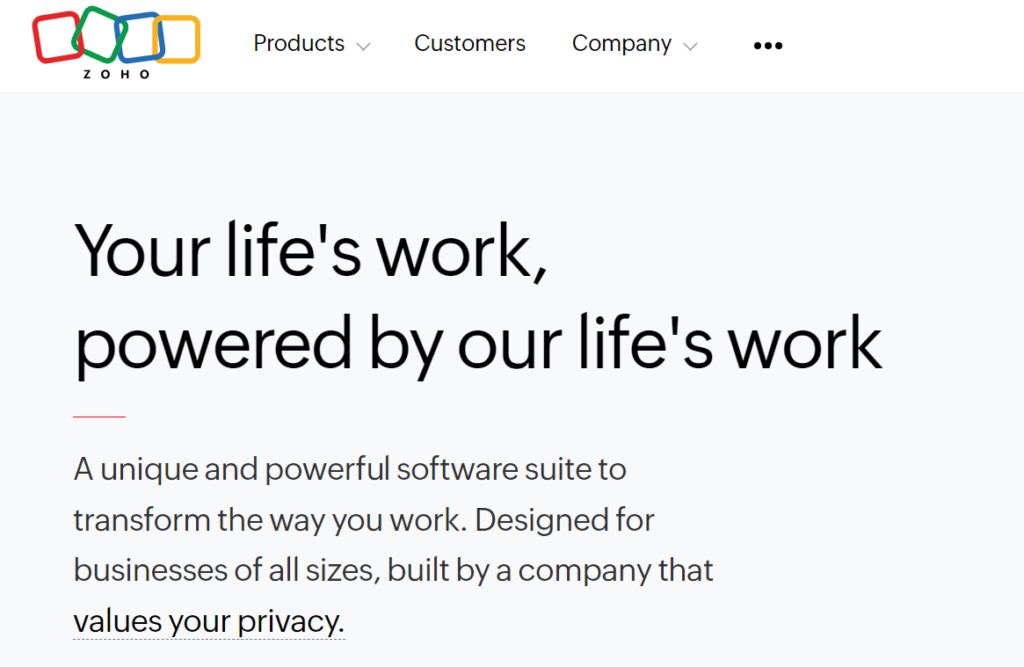
- Lead scoring software from Zoho
Zoho is a versatile CRM and marketing software that uses multiple channels for lead scoring.
Key features:
- Customizable scoring: You can fully customize various criteria to separate leads into “hot,” “cold,” or “warm.”
- Email marketing: You can use Zoho's built-in email marketing feature to build personalized email campaigns for captured leads.
- Task tracking: This lets you keep track of important tasks and revisit conversations for each prospect.
- Behavior-based scoring: This feature analyzes how leads are interacting by studying responses to emails, website visits, and form submissions.
Best fit:
Companies looking for an affordable solution that allows them to manage leads from multiple sources.
Pricing:
The pricing ranges between $14 and $52 per month per user.
Pecan AI: Leading the way
Despite the presence of multiple software, Pecan AI shines in the lead-scoring domain.
Although it offers great CRM tools, Salesforce can only export lead data stored within the Salesforce system.
Other popular software like HubSpot often operates as “black boxes” because they don’t give you insight into how lead-scoring predictions are made.
Pecan AI is different, as it prioritizes transparency. Your input data is used to calculate scores, and you’ll know exactly how this was done and how each variable contributed to each score.
With Pecan, you can integrate data from multiple systems. This makes sure no lead data is left behind and you have a comprehensive sales strategy.
Moreover, unlike manual lead scoring, which can be time-consuming and prone to human error, Pecan’s automatic scoring uses machine learning to rank the leads accurately.
It allows you to make more informed decisions. You can then allocate resources efficiently to the specific lead demographics, helping you convert more leads into paying customers.
Start a free trial or get a guided tour today to learn more about what lead scoring software from Pecan AI can do for you.



